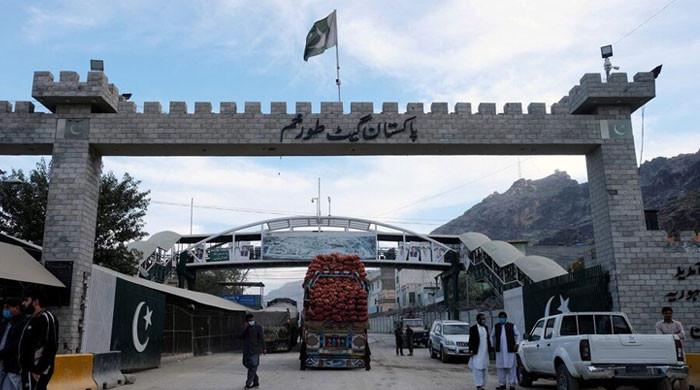Economic recovery, disinflation focus of new loan programme: IMF
Pakistan is likely to receive first tranche of $1.1 billion by September 30 under $7 billion bailout package
September 27, 2024

- Kristalina Georgieva underscores "very productive" meeting with PM.
- Says new bailout package aims at creating jobs, inclusive growth.
- Managing director underscores increased tax fairness and reforms.
International Monetary Fund (IMF) Managing Director Kristalina Georgieva has said that the new bailout package approved for Pakistan is aimed at assisting the government in economic recovery and reduction in inflation along with employment creation and inclusive growth.
"Very productive meeting with Pakistan PM @CMShehbaz! We discussed Pakistan's new Fund-supported program helping ongoing recovery, disinflation, increased tax fairness, and reforms to create new jobs and inclusive growth," said the top IMF official in a post on X while referring to her meeting with Prime Minister Shehbaz Sharif.
Her statement comes after the Executive Board of the Washington-based lender approved a $7 billion Extended Fund Facility (EFF) with the first tranche of $1.1 billion likely to be released by September 30, 2024.

Faced with chronic mismanagement, Pakistan's economy has found itself on the brink, challenged by the Covid-19 pandemic, the effects of the war in Ukraine and supply difficulties that fuelled inflation, as well as record flooding that affected a third of the country in 2022.
With its foreign currency reserves dwindling, Pakistan found itself in a debt crisis and was forced to turn to the IMF, obtaining its first emergency loan in the summer of 2023.
The latest bailout, coming to Pakistan in the form of loans, follows a commitment by the government to implement reforms, including a major effort to broaden the country's tax base — a measure reflected in the tax-heavy budget passed earlier this year by the incumbent administration.
Furthermore, IMF Pakistan Mission Chief Nathan Porter has confirmed that multiple friendly nations have given "significant financing assurances" to Islamabad linked to the bailout package which go beyond the agreement to roll over $12 billion in bilateral loans owed to these countries.
Sources in the Ministry of Finance have said that the interest rate on the loan is less than 5% and the lender might even disburse the second instalment within this fiscal year.
The key priorities, as reported by The News on Friday, under the new EFF-supported programme include: (i) rebuilding policy making credibility and entrenching macroeconomic sustainability through consistent implementation of sound macro policies and a broadening of the tax base; (ii) advancing reforms to strengthen competition and raise productivity and competitiveness; (iii) reforming the state-owned enterprises (SOEs) and improving public service provision and energy sector viability; and (iv) building climate resilience.
Earlier, reacting to the development, PM Shehbaz voiced satisfaction over the approval of the loan programme and thanked Georgieva and her entire team along with friendly countries, particularly Saudi Arabia, China, and the United Arab Emirates (UAE) for their support in securing the new loan programme.
Meanwhile, during his meeting with IMF's Georgieva, the PM highlighted the government's commitment to implementing structural reforms and promoting private sector development, the publication added.
He also appreciated the lender's technical assistance and capacity-building programmes, which helped strengthen the country’s institutions and improve its economic management.
Meanwhile, the IMF managing director underscored the importance of maintaining macroeconomic stability and promoting inclusive and sustainable growth.
The two leaders also agreed to strengthen cooperation between the government and the IMF to promote economic stability and growth.
Speaking to Geo News earlier in the week, Georgieva had underscored the positive effects of home-defined and Pakistan-owned reforms.
Growth is up inflation is down and the economy is on the sound path [....] The government aims to collect taxes from the rich and strengthen the Benazir social programme to support the poor," she had said while confirming the new loan programme's approval.











